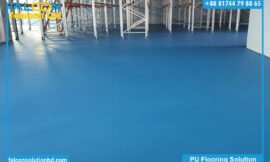As the world continues to evolve with technological advancements, the heating, ventilation, and air conditioning (HVAC) industry is undergoing a significant transformation. With an increasing focus on energy efficiency, smart automation, and environmental sustainability, the future of HVAC is driven by revolutionary technologies that promise to reshape how we heat and cool buildings.
Smart HVAC Systems and AI Integration
Artificial intelligence (AI) and the Internet of Things (IoT) are at the forefront of the HVAC industry’s transformation. Smart HVAC systems equipped with AI-driven algorithms can analyze real-time data, predict temperature fluctuations, and optimize heating and cooling performance. IoT-connected sensors further enhance these systems by continuously monitoring air quality, humidity levels, and energy consumption, providing homeowners and building managers with precise control over their indoor environments.
With AI integration, predictive maintenance is becoming a game-changer. Instead of relying on scheduled servicing, HVAC systems can now detect inefficiencies, anticipate potential failures, and notify users before costly breakdowns occur. This proactive approach not only improves system longevity but also reduces maintenance costs.
Energy Efficiency Through Advanced Heat Pumps
The demand for energy-efficient HVAC solutions has led to the rise of next-generation heat pumps. Modern heat pumps now feature variable refrigerant flow (VRF) technology, which allows systems to adjust cooling and heating output based on real-time demand. This leads to significant energy savings when compared to conventional HVAC systems.
Additionally, geothermal heat pumps, which utilize the earth’s stable underground temperature for heating and cooling, are becoming a sustainable alternative for residential and commercial buildings. By harnessing renewable energy sources, these systems contribute to lower carbon footprints and reduced reliance on fossil fuels.
HVAC Automation and Building Management Systems (BMS)
Automation is transforming how HVAC systems function and are managed inside buildings. Advanced Building Management Systems (BMS) allow facility managers to monitor and control multiple HVAC units from a centralized platform. These smart controls help optimise energy usage, enhance occupant comfort, and provide insights into system performance.
Automation allows HVAC systems to respond in real time to how many people are in a space. In offices or commercial buildings, for instance, sensors can sense when a room is empty and lower the heating or cooling, helping to avoid unnecessary energy use. This level of control not only improves efficiency but also lowers operational costs.
For more latest news visit our Bouncer News
The Role of Sustainable and Eco-Friendly Refrigerants
With rising environmental awareness, the HVAC industry is increasingly moving toward the use of eco-friendly refrigerants. Traditional refrigerants, such as hydrofluorocarbons (HFCs), contribute to greenhouse gas emissions and global warming. Newer alternatives like hydrofluoroolefins (HFOs) and natural refrigerants (such as CO2 and ammonia) offer lower global warming potential (GWP) and improved energy efficiency.
Government regulations are also playing a crucial role in this transition, with policies aiming to phase out high-GWP refrigerants in favor of eco-friendly alternatives. HVAC manufacturers are responding by designing next-generation systems that comply with these environmental standards.
Ductless Mini-Split Systems: The Future of Zoned HVAC
Ductless mini-split systems are becoming increasingly popular due to their energy efficiency and adaptability for use in both homes and businesses. These systems allow for zoned heating and cooling, enabling users to control temperatures in individual rooms without the need for extensive ductwork.
The benefits of ductless systems include improved indoor air quality, reduced energy loss, and customizable comfort settings. As smart home integration becomes more widespread, ductless mini-splits equipped with Wi-Fi connectivity and voice control are expected to become the standard choice for modern buildings.
Air Purification and Indoor Air Quality (IAQ) Enhancements
The COVID-19 pandemic has heightened awareness of indoor air quality, leading to increased demand for HVAC systems with integrated air purification features. Advanced filtration technologies, such as HEPA filters, UV-C light disinfection, and bipolar ionization, are being incorporated into modern HVAC units to reduce airborne pollutants, allergens, and pathogens.
With growing concerns over respiratory health, businesses and homeowners are prioritizing HVAC solutions that ensure cleaner and healthier indoor environments. Future HVAC systems will likely feature real-time air quality monitoring and automatic adjustments to maintain optimal IAQ levels.
Renewable Energy-Powered HVAC Solutions
Renewable energy sources like solar and wind are transforming how HVAC systems operate and paving the way for the industry’s future. Solar-powered air conditioning units and hybrid HVAC systems that combine renewable energy with traditional power sources are becoming viable options for sustainable heating and cooling.
These innovations not only reduce dependency on conventional energy grids but also provide long-term cost savings. As renewable energy technology advances, we can expect even greater adoption of self-sustaining HVAC solutions in homes and commercial buildings.
Conclusion: The Future of HVAC is Here
The future of HVAC is driven by revolutionary technologies that enhance efficiency, sustainability, and user comfort. From AI-driven smart systems to eco-friendly refrigerants and renewable energy integration, these advancements are transforming how we manage indoor environments.
Service ac jakarta: For home and building professionals, staying ahead of these emerging trends is essential to delivering innovative solutions that align with evolving energy regulations and environmental goals. By embracing cutting-edge HVAC technologies, businesses and homeowners can achieve superior climate control while reducing costs and environmental impact.





